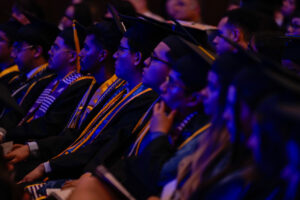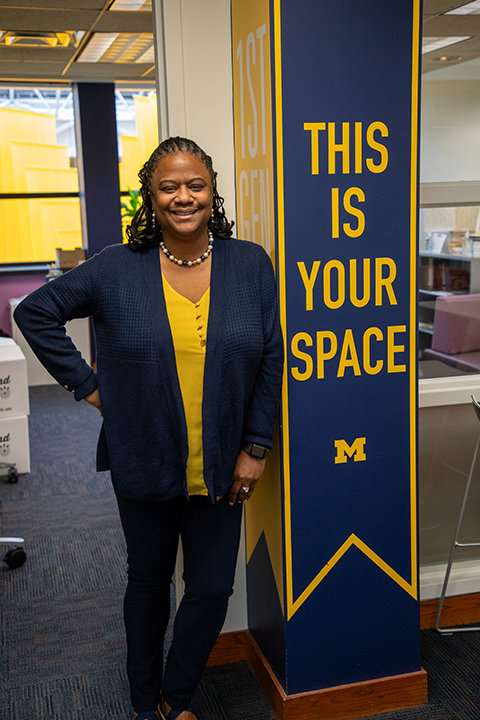At the 2024 Celebración Latina, one of seven multicultural graduations hosted by the Office of Academic and Multicultural Initiatives (OAMI) at the University of Michigan, graduates of Latinx heritage gathered together with their families and fellow community members to honor their achievements and contributions to the U-M campus.
Marking the occasion was invited speaker and U-M alum Robert L. Santos, director of the U.S. Census Bureau — the first Latino to hold the position. His speech reflected his personal journey and served as an inspirational message that resonated deeply with the audience.
With more than four decades of experience in survey research, statistical design and analysis, Santos recounted his beginnings as a graduate student at the University of Michigan.
Born and raised in San Antonio, TX, he admitted feeling out of place when he first arrived in Ann Arbor in 1976, where he was one of very few Latinx students. “I was just another vato loco in San Antonio. I came here, and I was learning all these mathematical proofs and doing this and that, and I was scared. I was really scared.” Despite these initial fears and culture shock, these experiences shaped his academic and professional life.

One of the most powerful aspects of his speech was his reflection on the support he found within the small Latinx community on campus. “There were so few of us that if we found each other, we’d race over and give abrazos. I was like, we found each other. We ended up getting together, working with each other, and helping each other out. We weren’t all in sociology or this or that — I was in statistics, we had folks in law school. We had folks everywhere, [which] instilled in me the values of nosotros, helping each other.” This sense of community, Santos emphasized, was not just helpful but crucial in helping him navigate his early years at the university.
However, Santos also noted that Latinos “…are not monolithic in our identity. Latinos can be Mexican, Cuban, Puerto Rican, and so on. Hispanics can also be Catholic or Evangelical or Muslim; male, female, or some other gender; impoverished, middle-income, even wealthy; and, yes, monolingual, bilingual, or multilingual. I love that about us.”
Santos also discussed a significant turning point in his career while participating in a federal study. While acknowledging that his statistical training was invaluable, his personal experiences and cultural background enriched his professional contributions. This realization underscored the importance of diversity in academic and professional settings, highlighting how personal background can bring unique perspectives that enhance collective understanding and progress. “I believe our collective diversity — Latino or otherwise — makes our nation and communities stronger and more special. When we take our own journeys of identity and grow from the paths we have chosen, we’ll all be better professionals and better human beings for it,” he said.
Santos noted that there were far more Latino students in the room than when he graduated, a fact punctuated by statistics from Census Bureau data that confirms the United States is increasingly more diverse. He encouraged the graduates to embrace their identities and backgrounds, that each individual’s personal identity will help them succeed.
His words were a powerful reminder that true success comes from authenticity and the courage to bring one’s whole self to every endeavor, a message sure to resonate with the Class of 2024.
“No one in the world knows exactly how much OAMI does,” says Rachel Dawson, the Office of Academic and Multicultural Initiatives’ (OAMI) executive director, attempting to detail the organization’s vast impact. “OAMI’s menu of programs is significant. People participate in our programs all the time, not realizing it’s OAMI work.”
Dawson began her tenure as Director in October 2023 as the organization celebrates its 35th anniversary. She is just the third leader of the organization, a testament to its strength in serving students from a variety of backgrounds across the University of Michigan. In its early days, OAMI focused on supporting prospective students with pre-college programming. Today, OAMI works directly with current U-M students by providing mentorship and tutoring, hosting the annual cultural graduation ceremonies and Martin Luther King, Jr. Symposium, providing a space where students can gather among peers, and so much more, including a renewed focus on developing student leaders. OAMI also employs approximately 80 students each year.
First and foremost, though, is a focus on student—and academic—success across all OAMI initiatives. It’s also Dawson’s passion that brought her to the role. Retaining students from underrepresented backgrounds and supporting them through graduation is integral to all current programming.

Dawson, an undergraduate student at the University of Michigan in the early 1990s studying biology and political science, described that the “campus energy was vibrant. There was a strong presence of Black people being very active and visible.” She acknowledges that she reaped the benefits of the student activism of BAM III, which occurred in 1987, as well as the energy and attention that came to campus life with U-M basketball’s famous Fab Five.
“The year I graduated was the highest percentage of Black students [to date]. We had a small Black community; it was very close-knit. It was the pre-technology age. We didn’t have cell phones. We didn’t own computers—we went to the computer lab. So we all knew each other, we supported each other and built authentic, close-knit relationships. I felt included. I felt welcomed.”
Although she did not know of OAMI during her tenure as a student, Dawson said she was very aware of the MLK Symposium, and was a student volunteer for its annual Unity March.
Dawson thinks it’s more difficult now to be a student of color at U-M, with “dwindling enrollment numbers,” and “the divisive times in which we live,” citing “anti-DEI” and “anti-Blackness” in particular. That’s where OAMI comes in. Even though “Michigan has committed so many resources to create a campus climate of inclusion and belonging,” Dawson knows that students of all backgrounds struggle to find these comfortable spaces across a vast and decentralized campus. “We need to make the students feel that they’re caught in a web, a network of resources, and not lost in a circle of confusion. My hope is that the staff and faculty can make this less confusing for them and help them find the resources that are here to benefit them.”
Despite this focus, Dawson notes that the first-generation student population is the largest group of students for whom OAMI provides support. These students, she says, are “mainly white and from rural Michigan,” dispelling the notion that OAMI is only a place for students of color. Those who are Hispanic, Native American, Middle Eastern and North African (MENA), Asian and Pacific Islander, and Undocumented, all have dedicated programs in OAMI. But as a Black woman leading OAMI, Dawson said that Black students are “a population I have concerns about. They are probably the population least engaged by OAMI. I intend to dedicate focused attention to reaching out to our Black students.”
I’m here. I care. I see you. I hear you. I’m here for you. I was once one of you. Let’s build a relationship in OAMI for you.
She says specifically to them: “I’m here. I care. I see you. I hear you. I’m here for you. I was once one of you. Let’s build a relationship in OAMI for you.”
At a time when campus support is needed more than ever for students from a multiplicity of backgrounds, Dawson could not be more energized about the work she has ahead. “OAMI is going to help students be successful at Michigan. We’re going to retain them at Michigan, and improve the graduation rates for students at Michigan. I am very excited to be able to be the voice fighting for our students, for this work, and for programs such as ours.”
To learn more about OAMI, including programs and events, visit oami.umich.edu.
We’re excited to announce an incredible opportunity for U-M students! You have a chance to make your voice heard on a stage that resonates with the beats of change at the 2023 DEI Summit Student Hip-Hop Cypher.
This event is part of the 2023 DEI Summit Community Assembly & Discussion, taking place on Monday, October 9th, from 10-11:30 am at the Power Center for the Performing Arts. It’s an excellent opportunity for students to be part of a powerful moment that highlights storytelling in the context of critical race theory and hip-hop culture.
The summit’s theme, Truth Telling: The Kinship of Critical Race Theory and Hip-Hop, will explore the transformative power of storytelling in both movements. We’re searching for students who can personify this theme through their unique hip-hop or spoken word pieces, reflecting their authentic stories, experiences, and insights.
To learn more and find submission guidelines and tips, please visit our website: Call for Student Hip-Hop Cypher Submissions
This is a chance for students to ignite change, craft an authentic and dynamic moment, and let their creativity flow. Don’t miss out on this incredible opportunity!